General News
Events
People
Publications
General News
Management Centre moves to University main building
The OCCR management centre is about to move to new premises. From the end of November 2018, you will find us on the third floor (west wing) of the University’s main building. Our office numbers are 323 – 330, the address is Hochschulstrasse 4. Visitors are welcome, come and enjoy our XXL lounge area…
OCCR researchers make the news
This year's exceptionally hot and dry summer lead to a sudden rise of calls for expert interviews by Swiss media. Several OCCR researchers were regularly asked for their expertise. Have a look at the press coverage regarding OCCR members. Moreover, some recent research papers made the news. Thomas Frölicher's (Ocean Modelling group) Nature paper on marine heatwaves even made it to the front page of the Bernese daily Der Bund. Research results in a different area that were met with a lot of interest by the media were provided by Christian Pfister (Emeritus with the Environmental History and Historical Climatology group). His study "The 'Black Swan' of 1540: Aspects of a European Megadrought" led to many reviews and interviews among others in the Frankfurter Allgemeinen and the NZZ am Sonntag. Have a look at the extensive press coverage.
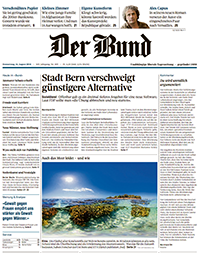
1868 - a flood that changed Switzerland
With a public event at the House of the Academies in Bern, the OCCR has launched a new publication called “1868 - a flood that changed Switzerland”. This 60 pages strong brochure, written for an non-scientific audience, is the fruit of the collaboration of researchers from all fields of the OCCR. The project was initiated and co-ordinated by Stefan Brönnimann (Climatology group) and has produced an in-depth analysis and reconstruction of the flood that affected large parts of the Alpine region in Switzerland in autumn 1868. The objective was not only to better understand the past, but as well to provide knowledge on how to deal with this form of natural disasters in the future.
The brochure can be downloaded – for the time being in German. English, French and Italian versions are in print.
Read a story on this OCCR project in the University of Bern’s web journal (in German) and see a video (in German) that explains the methods used for the reconstruction of the flood of 1868.
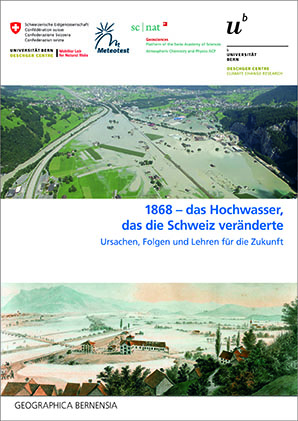
Very attractive Master Progam in Climate Sciences
The OCCR-operated Graduate School of Climate Sciences seems to attract an increasing numbers of Master students again after a ditch in 2016. Fortunately, more Bachelor students from the University of Bern as well as from Europe and from overseas are enrolling. Some explanations for this renewed interest might be found in a weaker Swiss Franc, an enhanced profile of the social science and economics specializations, a rising awareness of climate change overseas, and most importantly, the avid and persistent advertising by the Graduate School teachers and supervising faculty.
Update your personal Websites
As any ambitious researcher, OCCR members should care about their presence on the internet. If you are a PostDoc or a more senior researcher, make sure that your personal website or the one of your research group includes an updated CV. You want the people who are interested in your work to find details about your career as easily as possible, don’t you?
Events
Two Climate Summer Schools on different levels
A number of 32 students from eleven nations participated in the first International Bachelor Summer School for Climate Change Research which was co-organized by the OCCR. The two-week event was entitled “Confronting Climate Change - from Science to Policy” and brought together students from different disciplines, including natural sciences, economics and law. Participants were full of praise for high-level lectures, the interdisciplinary focus, and the joys of summer in Bern. Read an article in the University of Bern’s online journal on the Bachelor Summer School and have a look at the video statements of participants.
Almost in parallel, the Swiss Climate Summer School 2018 took place in Grindelwad. This event was offered for PhDs and PostDocs and was jointly organized by the OCCR and C2SM of the ETH Zurich. The focus of this summer school was “Earth system variability through time”. Participants came from 16 nations and four continents.
Climate Reconstruction and Impacts from the Archives of Societies
On 1 – 2 October 2018, a workshop called "Methods and interdisciplinary communication in historical climatology" will take place at the University of Bern. This meeting is the first event within in the framework of the PAGES Working Group Climate Reconstruction and Impacts from the Archives of Societies (CRIAS). One of the four leaders of this Working Group is Chantal Camenisch from the OCCR’s Environmental History and Historical Climatology group. The aim of the 1st CRIAS workshop is to evaluate and integrate different methodological approaches from historical climatology over all historical periods and geographical regions, and to identify and disseminate best practices in the field. Additionally, it aims to promote interdisciplinary collaboration between historical climatologists and (paleo)climatologists, especially by identifying ways to effectively share historical climatology data and combine historical and paleoclimate information in high-resolution reconstructions. Program
Double seminar on climate adaption research
On 10 December 2018 from 15.00 to 18.00, two distinguished US scholars in the field of social sciences will hold a double seminar at the OCCR. Jesse M. Keenan is a member of the faculty of the Graduate School of Design at Harvard University. His principle research focus is on climate change adaptation and the built environment, including aspects of financing, design, engineering, and planning. The title of his talk reads: "Climate Adaptation Finance and Investment in the U.S." Jesse’s newest book is related to this topic as well. Edella Schlager is a Professor with the School of Government and Public Policy at the University of Arizona. Her research focuses on comparative institutional analyses of water laws, policies and property rights. She is particularly interested in the design and performance of polycentric systems of water governance and how well such systems of water governance adapt to changing environmental, legal, and social circumstances.
International Colloquium on Digital Archaeology
On 4 -6 February 2019, the colloquium “Digital Archaeology: Quantitative approaches, spatial statistics and socioecological modelling” will take place at the University of Bern. This event is sponsored by the OCCR and addresses issues such as:
- quantitative approaches in spatial and non-spatial archaeological case studies
- data mining and new techniques of supervised and unsupervised pattern recognition in archaeological and environmental datasets
- applications and approaches to socioecological modelling on different scales and temporal resolutions
Deadline for abstract submission and registration are 11 November 2018 and 1 January 2019. Details.
How not to forget floods
This year’s autumn event of the Mobiliar Lab for Natural Risks on 14 November 16:30 – 19:15 will raise the topic of how to learn from past floods. What can be done to keep memories of these disasters? What lessons can we learn from past events? And what should measures derived from these learnings look like? The public event addresses researchers and practitioners alike, it will take place at the Institute of Geography, Hallerstrasse 12, Hörsaal 001. Details on the program will follow shortly.
Welcome Meeting for new OCCR members
This year’s welcome meeting for new OCCR members takes place at the OCCR Management Centre, Falkenplatz 16 on Thursday, 25 October 2018, 16:30 – 18:00. All new members have been invited directly, please register no later than 15 October 2018 by sending an e-mail to meuli@oeschger.unibe.ch.
People
Ambizione grant for Jakob Zscheischler
Jakob Zscheischler who is currently a PostDoc at the ETH Zurich (land-climate dynamics group), will move to the OCCR to build up his own research group with the help of an Ambizione grant. The title of his project is: „New metrics for constraining multiple drivers of hazards and compound hazards”. The summary of the project reads: "Climate hazards such as heatwaves, droughts and storms often lead to devastating impacts. The impacts are particularly severe when several hazards occur at the same time. It is unclear how well current climate models capture the relationships between co-occurring hazards. This project will develop new metrics to evaluate climate models with respect to multivariate relationships and compound hazards, constrain climate model ensembles with observations to improve risk projections, and relate climate hazards to impacts to estimate the importance of climate in comparison to vulnerability and exposure for high-impact climate events."
Radio talk with Thomas Stocker and Olivia Romppainen
Thomas Stocker (Earth System Modelling – Climate Dynamics group) and Olivia Romppainen (Mobiliar Group for Climate Impact Research) will be guests of a public radio talk show called “MäntigApéro” on 15 October 2018, 18:30 at the Theater National, Hirschengraben 24, Bern. The talk is labeled “Weather and Science”. Details.
Oliver Heiri becomes associated member
Oliver Heiri (ex-Aquatic Paleoecology group) has taken up his new position as Associated Professor for Geoecology at the University of Basel as of August 2018. He will remain related to the OCCR as an associated member.
David Janssen: Field work in the Southern Ocean
David Janssen who is a PostDoc with the Paleoceanography and marine biogeochemistry group has joined a research expedition from 12 September to 8 October on the Australian marine research vessel RV Investigator. The ship is going to the Southern Ocean and the East Australian Current, and the scientific plans will involve water column sampling and sediment coring. Have a look at the cruise plan for more details.
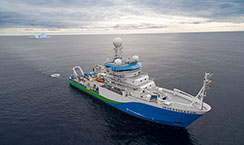
Sandra Brügger: Drilling sediment cores in Tansania
Sandra Brügger, who is a Ph.D. with the Terrestrial Paleoecology group, will be part of a drilling expedition in Lake Victoria, Tansania from 13 to 27 October 2018. This campaign is part of a project involving the OCCR groups Lake Sediments and Paleolimnology, Terrestrial Paleoecology as well as Quaternary Geology and Paleoclimatology as well as the Institute of Ecology & Evolution of the University of Bern. The project aims to bring knowhow from paleoclimatology to evolution biology. It is called “Digging deep into Lake Victora's past: 15,000 years of ecosystem dynamics and evolution reconstructed from sediment cores of the world’s largest tropical lake”.
Researchers who have recently joined the OCCR:
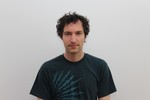 |
Moritz Buchmann is a new PhD student with the Climatology group. He gained a MSc in Environmental Sciences at the ETH with a thesis entitled “Changes of snow onset and disappearance dates during the last 60 years in the Swiss Alps”. His
current research is on Climate Change, time series analysis, snow, and snow measurements. The title of his PhD thesis is “How does homogenization of snow measurements impact snow climatology in the Alps?” |
| |
Marcel Bühler is a new PhD student with the Climatology group. He did a Master in Climate Sciences at the OCCR’s Graduate School of Climate Sciences with a thesis entitled “Testing and application of an AirCore device for vertical air profiling”. Marcel’s current research focus is on modelling, backward Lagrangian stochastics, inverse dispersion technique, methane emissions from animal and waste processing operations, and GHG. The working title of his PhD thesis is “Assessment of methane emissions from sources such as farms, biogas plants and wastewater treatment plants using an inverse dispersion technique”.
|
 |
Victor Onink is a new PhD student with the Earth System Modelling – Biogeochemical Cycles group. He did a Master in Climate Physics at Utrecht University with a thesis entitled “Modeling the accumulation of floating microplastic in the subtropical ocean gyres”. Victor’s research focus is on modeling the fate of microplastic in the oceans, with a special emphasis on microplastic removal processes. The title of his PhD thesis is “Simulating the global distribution and impact of plastic particles on the marine environment”. |
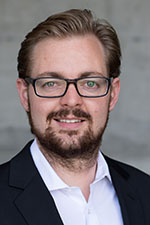 |
Martin Rauber is a new PhD student with the Laboratory for the Analysis of Radiocarbon with AMS (LARA). He gained an MSc in Molecular Technologies at the University of Applied Sciences and Arts Northwestern Switzerland (FHNW) and second MSc in Chemistry and Molecular Sciences at the University of Bern. Martins work will focus on the source apportionment of carbonaceous aerosols with radiocarbon. |
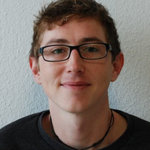 |
Jonas Stegmaier is a new PhD student with the Analytical Chemistry Research group. He gained his MSc in Geochemistry at the University of Freiburg, Germany with a thesis entitled “Tracing hydrochemistry of contrasting, merging streams in Taubergiessen, SW-Germany”. Jonas’research focus is on geochemical cycles of various spheres and the study of anthropogenic influences on those. His PhD thesis is entitled: “Trace element analysis in glacier ice cores using ICP-TOF-MS”. |
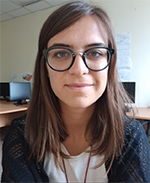 |
Pauline Rivoire is a new PhD student with the Mobiliar Group for Climate Impact Research. She did a Master in applied mathematics at the university of Lyon (France), with a thesis entitled “Regional frequency analysis of extreme droughts in the Mediterranean region”. Pauline’s research focus is on mathematics applied to climatology and hydrology. The title of her PhD thesis is: “Sstatistical verification and analysis of extreme precipitation in ERA-5 and detection and quantification of temporal clustering”. |
| |
|
A warm welcome to all of you!
Researchers who have recently left the OCCR:
Daniel Bernet who was a PhD student with the Mobiliar Group for Climate Impact Research and the Hydrology group. He is now an analyst with the Model Product Management department at RMS in Zurich.
Juan Carlos Chang has been a PhD student with the Climatology group.
Georgina King has been an Ambizione research fellow with the Quaternary Geology and Paleoclimatology group.
Irina Mahlstein who was a PostDoc with the Mobiliar Group for Climate Impact Research. She is now a Scientific Coordinator with the IT'IS Foundation in Zurich.
Fabian Rey who was a PhD student with the Terrestrial Paleoecology group. He is now a Laboratory Manager at the University of Basel.
All the best for your future career!
Recent journal publications by OCCR members
See all the publications by OCCR members.